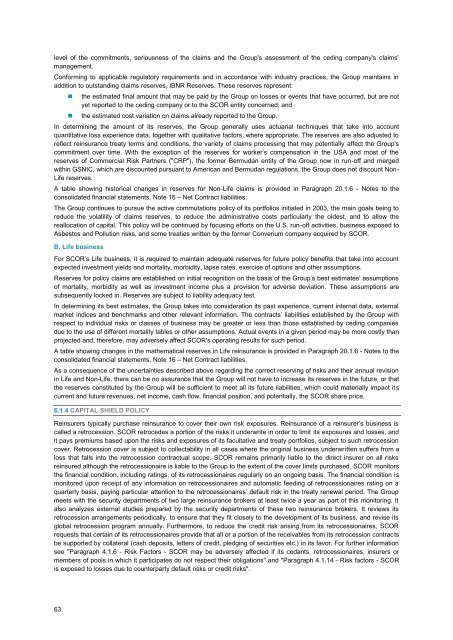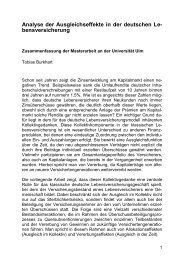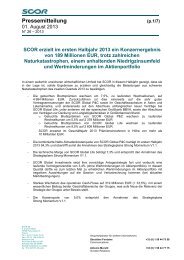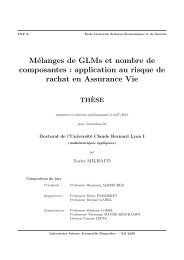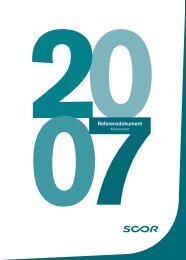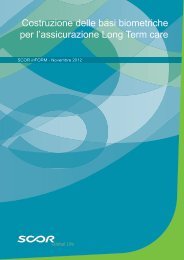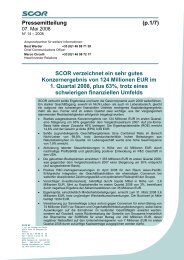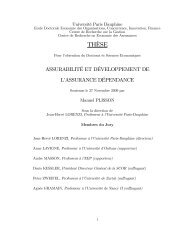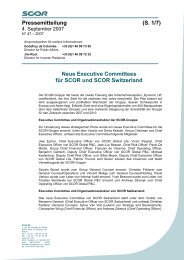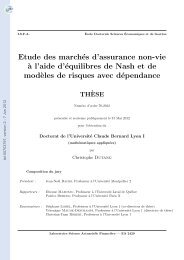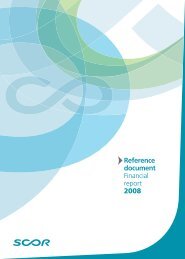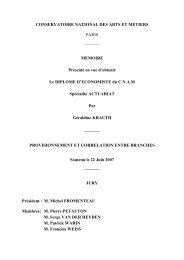4.4 Legal risk - Scor
4.4 Legal risk - Scor
4.4 Legal risk - Scor
Create successful ePaper yourself
Turn your PDF publications into a flip-book with our unique Google optimized e-Paper software.
level of the commitments, seriousness of the claims and the Group's assessment of the ceding company's claims'<br />
management.<br />
Conforming to applicable regulatory requirements and in accordance with industry practices, the Group maintains in<br />
addition to outstanding claims reserves, IBNR Reserves. These reserves represent:<br />
• the estimated final amount that may be paid by the Group on losses or events that have occurred, but are not<br />
yet reported to the ceding company or to the SCOR entity concerned; and<br />
• the estimated cost variation on claims already reported to the Group.<br />
In determining the amount of its reserves, the Group generally uses actuarial techniques that take into account<br />
quantitative loss experience data, together with qualitative factors, where appropriate. The reserves are also adjusted to<br />
reflect reinsurance treaty terms and conditions, the variety of claims processing that may potentially affect the Group's<br />
commitment over time. With the exception of the reserves for worker’s compensation in the USA and most of the<br />
reserves of Commercial Risk Partners ("CRP"), the former Bermudan entity of the Group now in run-off and merged<br />
within GSNIC, which are discounted pursuant to American and Bermudan regulations, the Group does not discount Non-<br />
Life reserves.<br />
A table showing historical changes in reserves for Non-Life claims is provided in Paragraph 20.1.6 - Notes to the<br />
consolidated financial statements, Note 16 – Net Contract liabilities.<br />
The Group continues to pursue the active commutations policy of its portfolios initiated in 2003, the main goals being to<br />
reduce the volatility of claims reserves, to reduce the administrative costs particularly the oldest, and to allow the<br />
reallocation of capital. This policy will be continued by focusing efforts on the U.S. run-off activities, business exposed to<br />
Asbestos and Pollution <strong>risk</strong>s, and some treaties written by the former Converium company acquired by SCOR.<br />
B. Life business<br />
For SCOR’s Life business, it is required to maintain adequate reserves for future policy benefits that take into account<br />
expected investment yields and mortality, morbidity, lapse rates, exercise of options and other assumptions.<br />
Reserves for policy claims are established on initial recognition on the basis of the Group’s best estimates’ assumptions<br />
of mortality, morbidity as well as investment income plus a provision for adverse deviation. These assumptions are<br />
subsequently locked in. Reserves are subject to liability adequacy test.<br />
In determining its best estimates, the Group takes into consideration its past experience, current internal data, external<br />
market indices and benchmarks and other relevant information. The contracts’ liabilities established by the Group with<br />
respect to individual <strong>risk</strong>s or classes of business may be greater or less than those established by ceding companies<br />
due to the use of different mortality tables or other assumptions. Actual events in a given period may be more costly than<br />
projected and, therefore, may adversely affect SCOR's operating results for such period.<br />
A table showing changes in the mathematical reserves in Life reinsurance is provided in Paragraph 20.1.6 - Notes to the<br />
consolidated financial statements, Note 16 – Net Contract liabilities.<br />
As a consequence of the uncertainties described above regarding the correct reserving of <strong>risk</strong>s and their annual revision<br />
in Life and Non-Life, there can be no assurance that the Group will not have to increase its reserves in the future, or that<br />
the reserves constituted by the Group will be sufficient to meet all its future liabilities, which could materially impact its<br />
current and future revenues, net income, cash flow, financial position, and potentially, the SCOR share price.<br />
6.1.4 CAPITAL SHIELD POLICY<br />
Reinsurers typically purchase reinsurance to cover their own <strong>risk</strong> exposures. Reinsurance of a reinsurer’s business is<br />
called a retrocession. SCOR retrocedes a portion of the <strong>risk</strong>s it underwrite in order to limit its exposures and losses, and<br />
it pays premiums based upon the <strong>risk</strong>s and exposures of its facultative and treaty portfolios, subject to such retrocession<br />
cover. Retrocession cover is subject to collectability in all cases where the original business underwritten suffers from a<br />
loss that falls into the retrocession contractual scope. SCOR remains primarily liable to the direct insurer on all <strong>risk</strong>s<br />
reinsured although the retrocessionaire is liable to the Group to the extent of the cover limits purchased. SCOR monitors<br />
the financial condition, including ratings, of its retrocessionaires regularly on an ongoing basis. The financial condition is<br />
monitored upon receipt of any information on retrocessionaires and automatic feeding of retrocessionaires rating on a<br />
quarterly basis, paying particular attention to the retrocessionaires’ default <strong>risk</strong> in the treaty renewal period. The Group<br />
meets with the security departments of two large reinsurance brokers at least twice a year as part of this monitoring. It<br />
also analyzes external studies prepared by the security departments of these two reinsurance brokers. It reviews its<br />
retrocession arrangements periodically, to ensure that they fit closely to the development of its business, and revise its<br />
global retrocession program annually. Furthermore, to reduce the credit <strong>risk</strong> arising from its retrocessionaires, SCOR<br />
requests that certain of its retrocessionaires provide that all or a portion of the receivables from its retrocession contracts<br />
be supported by collateral (cash deposits, letters of credit, pledging of securities etc.) in its favor. For further information<br />
see "Paragraph 4.1.6 - Risk Factors - SCOR may be adversely affected if its cedants, retrocessionaires, insurers or<br />
members of pools in which it participates do not respect their obligations" and "Paragraph 4.1.14 - Risk factors - SCOR<br />
is exposed to losses due to counterparty default <strong>risk</strong>s or credit <strong>risk</strong>s".<br />
63


